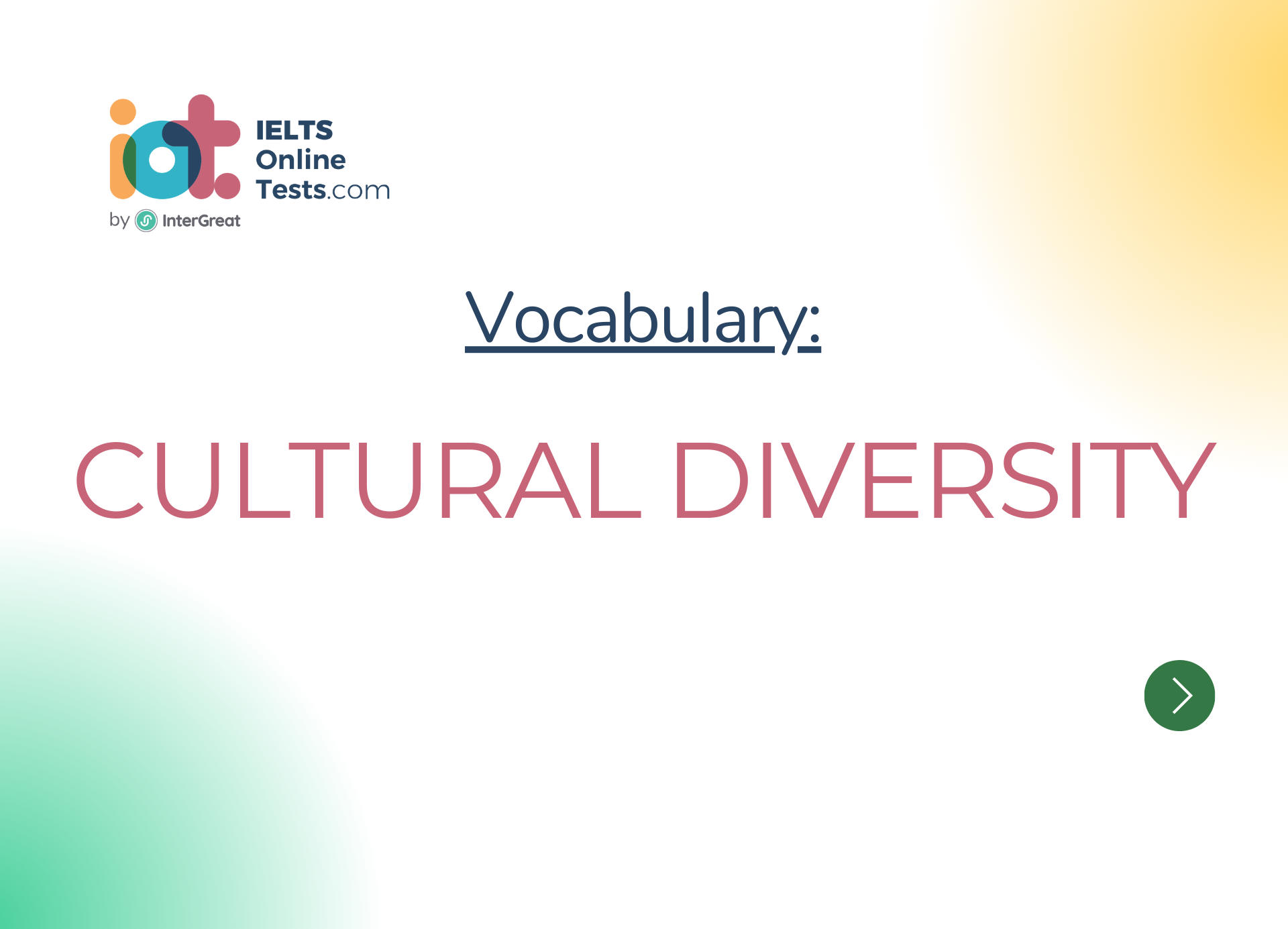
Cultural diversity
Below is a comprehensive list of vocabulary related to cultural diversity, along with their definitions. Familiarizing yourself with these terms will enable you to discuss various aspects of cultural diversity and its significance during the IELTS exam or any discussions related to multiculturalism and inclusion.
Cultural Diversity:
- Definition: The coexistence of different cultural backgrounds, ethnicities, religions, languages, and traditions within a society or community.
Multiculturalism:
- Definition: The policy or practice of recognizing, respecting, and promoting the diverse cultural identities within a society.
Inclusion:
- Definition: The action of involving and valuing individuals from diverse cultural backgrounds, ensuring they are represented and participate fully in society.
Cultural Identity:
- Definition: The sense of belonging and connection that individuals or groups feel towards their cultural heritage and traditions.
Ethnicity:
- Definition: The classification of people based on shared cultural traits, such as language, ancestry, and traditions.
Cultural Heritage:
- Definition: The traditions, customs, beliefs, and artifacts that are passed down through generations within a cultural group.
Intercultural Communication:
- Definition: The process of exchanging information and ideas between people from different cultural backgrounds.
Tolerance:
- Definition: The acceptance and respect for the differences in beliefs, customs, and practices of others.
Cultural Sensitivity:
- Definition: The awareness and understanding of cultural differences to avoid offending or misinterpreting others.
Diversity Training:
- Definition: Programs or workshops designed to educate individuals about cultural diversity and promote inclusivity.
Cross-Cultural Understanding:
- Definition: The ability to comprehend and appreciate the values, beliefs, and behaviors of other cultures.
Ethnocentrism:
- Definition: The belief that one's own culture or ethnic group is superior to others, leading to prejudice or bias.
Cultural Assimilation:
- Definition: The process by which individuals or groups adopt the dominant culture of a society and lose some aspects of their original cultural identity.
Cultural Pluralism:
- Definition: A social or educational model that encourages the coexistence of diverse cultural groups while maintaining their distinct identities.
Cultural Exchange:
- Definition: The sharing of cultural practices, knowledge, and traditions between different cultural groups.
Ethnic Minority:
- Definition: A group of people who share a particular cultural, racial, or ethnic background and form a smaller portion of the population.
Acculturation:
- Definition: The process by which individuals adopt the cultural norms and values of the dominant culture while retaining some aspects of their original culture.
Cultural Integration:
- Definition: The blending and harmonization of cultural practices and traditions between different cultural groups.
Cultural Adaptation:
- Definition: The process of adjusting to a new cultural environment and adopting its practices and behaviors.
Cultural Awareness:
- Definition: Consciousness and knowledge of one's own cultural background and an appreciation for the diversity of others.
Cultural Competence:
- Definition: The ability to interact effectively and respectfully with individuals from different cultural backgrounds.
Intersectionality:
- Definition: The interconnected nature of social categorizations, such as race, gender, and class, that create overlapping and unique forms of discrimination and privilege.
Cultural Celebrations:
- Definition: Festivities or events that honor and showcase the traditions and customs of a particular cultural group.
Prejudice:
- Definition: Unfair and negative attitudes or beliefs about individuals or groups based on their cultural background.
Cultural Revitalization:
- Definition: Efforts to preserve, promote, and revive cultural practices, languages, and traditions that may be at risk of being lost.
Cultural Norms:
- Definition: Accepted patterns of behavior, values, and beliefs within a specific cultural group.
Cultural Conflict:
- Definition: Tensions or disagreements arising from differences in cultural practices or values.
Cultural Exchange Programs:
- Definition: Initiatives that facilitate the exchange of individuals between different countries or cultures for educational or cultural purposes.
Diaspora:
- Definition: The dispersion of people from their original homeland to other parts of the world, resulting in the formation of diverse cultural communities.
Cultural Preservation:
- Definition: Actions taken to protect and safeguard cultural heritage and traditions from disappearing over time.
As you study and use these vocabulary words, aim to understand their meanings in various contexts and practice incorporating them effectively into your speaking and writing to demonstrate a strong understanding of cultural diversity during the IELTS exam.




